Lea Wait's Blog, page 6
September 9, 2025
Autumnal Writing and Other Things

I know it’s not autumn yet but it feels that way. The temperatures here in Maine are quickly dropping, especially at night. It’s noticeable because this past summer has been one of the hottest on record. So this Sunday after mowing the lawn and hitting the gym, my wife and I headed to the country to get us some apples and blueberries. Having completed two manuscripts this summer, the rest of my day was clear and free. There would be no writing today. It would be all about the apples—and blueberries. Oh, and riding mountain bikes along the country trail.
It was a beautiful day. We climbed in the car and drove the forty-five minutes out to the country. The smells of grass and cow manure filled the air. We arrived at the farm and immediately took in the rolling mountains and greenery. Come October, the colors would be more spectacular than they were now. But it was still quite beautiful. For once it was nice not to have to think about murder and deceit.
We climbed out of the car and got shuttled by golf cart to the main entrance. In the distance I could see rows upon rows of apple and blueberry groves. The day was festive and many people had already showed up. A two-man band played a Van Morrison song inside a tent-covered patio. Little kids danced in front of the two band members, along with their parents. The aroma of fresh beer, apple cider donuts and brick oven pizzas filled the air.
There were sweet varieties of blueberries and tangy blueberries, although we all agreed that the sweet blueberries were the tastiest. Three quarts tasty. Then we proceeded to the apple groves where we filled a large bag with Courtlands, Macs and Golden Delicious.
A great day of family fun. If only our son was home from college it would have been better. But we sent him the pics. Better hurry before they run out.
Then we went rented bikes and pedaled the trails. It’s fun until you crash. But the scenery is so beautiful. In another month it will be that much better.
Have a great fall, everyone!

September 8, 2025
Summer Gone? Don’t Stress!?!#%**?/&
Jule Selbo

This summer has gone by quickly and I feel like I wasn’t in the physical or mental shape to keep up with it, so I’m still panting and whining to reach the “ENJOY LIFE” and “DON’T STRESS THE STRESSFUL STUFF” signs at the end of the road. They point the way to hot tubs and massages and piles of wonderful books to read and enlightenment meditations that will activate the glow of peaceful acceptance. Of everything.
Like
Jule, you’ll never accomplish your page count goal everydayYou’ll never have every word you want to be there when you want it to type itYou’ll never stop worrying that your protagonist is solving the mystery too slowlyYou’ll never be able to heal all the people you know who are sick


I wanted to share some of the research I’ve been doing on detectives/investigators from Sherlock to Kinsey Malone to Reacher to Igor Jarinowski and how their non-social/loner proclivities pull us in as readers – but – well I won’t stress about not getting that research (which takes me away from finishing 6 DAYS a DEE ROMMEL MYSTERy). I’ll share it on my October post.

September 5, 2025
Weekend Update: September 6-7, 2025
 Next week at Maine Crime Writers there will be posts by Jule Selbo (Monday), Joe Souza (Tuesday), Vaughn Hardacker (Thursday), and Gabi Stiteler (Friday).
Next week at Maine Crime Writers there will be posts by Jule Selbo (Monday), Joe Souza (Tuesday), Vaughn Hardacker (Thursday), and Gabi Stiteler (Friday).
In the news department, here’s what’s happening with some of us who blog regularly at Maine Crime Writers:
Matt Cost just had a short story published in the anthology, Celluloid Crimes. Dead Men Don’t Kiss is a noir, 1950s gumshoe mystery set in Hollywood and shares space with sixteen other fantastic stories. On Thursday, September 11th, there will be a COST TALK at the Southport Memorial Library with a focus on Glow Trap. Write on.
Vaughn Hardacker will be selling and signing his books at Maine Authors in the Park on September 20th. The event will be from 10 a.m. to 2 p.m. at Old Mill Park, Main Street, Clinton, ME. The event is being hosted by Brown Memorial Library. I have learned they are still looking for authors. If you’re interested, the contact info is Brown Memorial Library, (207) 426-8686, kgiles@clinton-me.gov
Vaughn Hardacker has completed the first draft of the third novel in his Mike Houston/ Anne Bouchard series (Sniper and The Fisherman). Anyone interested in being a first reader?
-An invitation to readers of this blog: Do you have news relating to Maine, Crime, or Writing? We’d love to hear from you. Just comment below to share.
And a reminder: If your library, school, or organization is looking for a speaker, we are often available to talk about the writing process, research, where we get our ideas, and other mysteries of the business, along with the very popular “Making a Mystery” with audience participation, and “Casting Call: How We Staff Our Mysteries.” We also do programs on Zoom. Contact Kate Flora
There Is No Defense Against Styrofoam Gerbils

On a quiet street one morning. Can you tell the story?
John Clark, gearing up for the Maine Crime Wave. I’m part of two round tables (God forbid that they end up square!). One relates to short stories, the other to young adult mysteries. These are areas where I have some experience and plenty of interest. In preparation, I thought it would be useful to sift through the numerous caverns that comprise my brain and round up some coherent thoughts about why I write short stories, where the ideas come from, and what to do with them.
Some twenty years ago, sister Kate encouraged me to try my hand at short stories as she and others had launched the Level Best crime anthologies. I used a recurring nightmare in which I murdered a woman and hid her body, waiting for that knock on the door from the police as the subject of my first attempt. It was accepted and the dream went away. Subsequent short stories were inspired by a Tim Sample routine, the still unsolved theft of an entire stone wall at our late mom’s house, taillights reflecting off tombstones in a rural cemetery, Asian Lady Beetles, a vengeful ghost, and a lot more.
I’ve learned to be a careful observer of life around me as well as a very good listener. When my AA friend Massachusetts Jack qualified many years ago at a meeting, he began by saying “I liked being alone when I was a kid. It was the only time I understood all the rules.” After the meeting, I got his permission to use that as the opening for a short story, Tower Mountain, that was also published in a Level Best Anthology.
If you’re thinking about becoming a short story writer, or are already there and looking for encouragement and motivation, here are some thoughts.
1-Story ideas are all around you. Obituaries reveal interesting stuff almost daily, whether it be an unusual career, hobby, or a list of several ex-wives.
2-People say really interesting stuff if you encourage them to talk. It’s even better when they think they’re alone. I remember a most interesting conversation about what had to be a Bridezilla relative that took place between two women who were picking high bush blueberries up in Athens several years ago. I was a couple rows over and out of sight, but everything they said was clear as a bell. Likewise things kids shared with me when I was the librarian in Hartland made good story material. If some of the parents knew what those kids said, they would have died of mortification.
3-Things and people you see every day can be short story fodder. Stuff you see abandoned by the roadside, signs people put up for sales, or protests can be inspiring. I still marvel at the one a young woman held up at the No Kings protest here in Waterville. It said Support Whores, Not Wars. Along the same lines, you’re likely to see a most interesting person at least once a week. I used a very dignified man I saw walking on Route 27 in Pittston almost daily, as a character in a book. A person I saw at the Maine Mall who could only be described as 360 degrees ugly, became a blacksmith in another tale.
4-I guarantee you’ll have a random thought come through your mind at least once a week that has short story potential. This is also true if you read print newspapers on a regular basis, particularly those covering local news. If it sparks a question, it’s potential story material.
5-Read the work of other short story writers with a curious mind. There’s no reason you can’t come up with a better way, or new slant on a story someone else got published. It’s easy to forget that the New Story Idea Factory doesn’t run regular shifts. I can’t tell you how often I read a book that’s a rehash of a familiar plot. I’ve come to realize that this phenomenon, like recipes, can have uniqueness simply by how the ingredients and preparation are varied.
Now on to the benefits of short story writing.
1-When I’m ON, I can crank out one in a weekend, complete with it being revised and heard by my wife when I read it aloud.
2-There are plenty of short story markets you might not know about (More about that at the round table discussion at Maine Crime Wave)
3-Just because a story gets rejected in one venue, doesn’t mean it won’t be snapped up elsewhere. I had one I wrote for the Flash contest at the Crime Wave several years ago get picked up by an entity that published it on a subscription basis world wide a year later. Thus far I’ve gotten almost $350 in royalties from that one.
4-When you’ve written enough of them, you can put together an anthology. Stories already published elsewhere whose rights have reverted to you can be included. I’ve published Hardscrabble Kids and Dark Maine that way.
5-You can have tons of fun with oddball titles like I did with this blog.
Hope to see you at the Maine Crime Wave later this month.
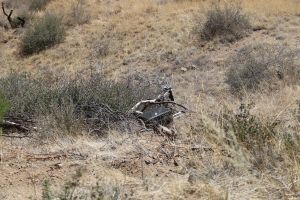
Elopement gone awry…Or worse. What does your creative muse tell you?
September 3, 2025
Murder, and All That Jazz
Carolyn Marie Wilkins’ newest novel, Murder At The Wham Bam Club, was released at the end of July. It’s her fourth mystery and her seventh book overall, the other three being non-fiction. Murder At The Wham Bam Club, set in the Roaring Twenties, features Nola Ann Jackson, a young widow, World War I having claimed the life of her husband, Harlem Hellfighter William Bartholomew Jackson. Nola has returned to her hometown of Agate, Illinois, where she lives with her psychic aunt, who helps her learn how to tap into her own inherited abilities.
Nola loves jazz, and in Agate, the premiere place to hear it is the Wham Bam Club, where rules—not only those about Prohibition—are broken all the time. One night a fire breaks out at the Wham Bam Club, and a showy trumpeter is shot to death. Nola’s new friend Lilly Davidson dated Eddie Smooth, but Nola is certain she didn’t kill him. To clear Lilly’s name she uses her natural detective skills and her psychic gifts, a valuable combination when it comes to solving crime.

Carolyn and I had a conversation last week about Murder At The Wham Bam Club and the fact that she’ll be a featured author at Maine Crime Wave on September 27. Here’s what we talked about:
∇
Q. Murder At The Wham Bam Club, your newest novel, is a tale of music, murder and supernatural happenings set in small-town Illinois during the Roaring Twenties. What kind of reactions have you had since you launched it on July 29 and what’s made you happiest about the response?
A. What a great question, Brenda! It has been wonderful to see my book, five years in the making, out in the world at last. The thing that has most pleased me is that readers seem to get my spunky psychic protagonist and enjoy spending time in her world.
Q. What parts of Murder At The Wham Bam Club were most enjoyable to write? How did the experience of writing it differ from your earlier novels?
A. The most enjoyable parts to write were the parts where I was able to fold real-life people and events from African American history into the story. I made the decision to include more history in this book than in my previous novels
Q. Like all of your mystery novels, Murder At The Wham Bam Club revolves around a murder, set in a milieu of fine jazz music, Black culture and psychic healing arts. To my knowledge you don’t solve murders in real life, but you’re an accomplished jazz pianist and vocalist, you hold dear the traditions of Black Americans and work tirelessly for racial justice, and you’re also a gifted psychic healer. Does it feel as organic as it looks to bring those important parts of yourself into your crime novels?
A. The writing process was not easy, but it was definitely organic. You know what they say – “write what you know.”
Q. Where did you grow up? What did you see yourself being when you were a child – a musician, a teacher, a writer or a healer?
A. I was born and raised on the South Side of Chicago, in the bosom of the black middle class. As a little kid, I wanted to be a cowboy. Since I could not persuade my family to move to Montana, I opted instead for music. My mother was a music teacher, and started me on the piano when I was four.
Q. When did you realize you could (or needed to be) all four simultaneously?
A. Not until late in life, about 3 years ago. When I was going to college, the expectation was that students would pick one discipline, major in it, then pursue it exclusively for the rest of their lives. It took me a while to understand that I could use a more wholistic approach.
Q. Given that you write books, teach and make music, and actively practice as a Reikki healer and a medium, how do you maintain balance in your life? What do you do for fun?
A. Such a great question! In the striving, success-oriented culture in which I grew up, fun was given short shrift! As I age, I’ve learned how important it is to savor every minute, especially the mundane, quotidian things – taking a walk, eating breakfast, laughing with friends and family etc. I’m a big fan of walking on the beach when I can. I am also a huge Celtics fan. Big fun to sit in a stadium full of like-minded people and scream myself hoarse. Go, C’s!!
Q. And go Red Sox until the Celtics season starts! You’ll be at Maine Crime Wave on September 27, hosting a roundtable discussion about bringing paranormal and supernatural elements into mystery novels. Can you give MCW blog readers some hints about how those conversations might unfold?
A. I’m super excited about having the opportunity to share this side of myself with my writing community! I have studied mediumship and the psychic arts for over ten years. In this round table, I’ll share some tips on how to write credible psychic characters. I’m also really looking forward to hearing from others about their ideas and experiences. It’s going to be a great conversation!!
∇
 Carolyn Marie Wilkins describes herself as “a multifaceted entrepreneur working at the intersection of spirituality and creativity.”
Carolyn Marie Wilkins describes herself as “a multifaceted entrepreneur working at the intersection of spirituality and creativity.”
In addition to her writing, she’s an accomplished Jazz pianist and vocalist who is a Professor at Berklee College of Music Online. A graduate of Oberlin Conservatory and the Eastman School of Music, Carolyn has performed with the Pittsburgh Symphony and represented her country as a Jazz Ambassador for the U.S. State Department. She’s also a Reiki master and a psychic medium who maintains a private practice in healing and mediumship.
Murder At The Wham Bam Club is available from your favorite bookseller. Carolyn will be signing copies at Maine Crime Wave, to be held at Mechanics Hall in Portland on Saturday, September 27 from 8:30 – 4:30, with special events (including a Noir At The Bar) to be held the previous evening, Friday, September 26.
FMI and to register: https://www.mainewriters.org/maine-crime-wave
September 2, 2025
Not Writer’s Block but Story Block
Kate Flora: I have always insisted that I don’t suffer from writer’s block. Indeed, I often think that writer’s block is more of an excuse not to engage with the work, wrestle with the challenges, and find a way forward, than a genuine dilemma. But that’s for me. I understand that some people truly do get blocked. I do, however, believe in story block, in those stories that sometimes refuse to be written. Usually there’s a way around this. Taking a walk, baking, cleaning out a closet, setting myself a difficult task in the garden. Anything, in short, that creates a break from staring at the screen and agonizing over what comes next. Frequently, when I’m done and return to the desk, I’ve found my way forward.
think that writer’s block is more of an excuse not to engage with the work, wrestle with the challenges, and find a way forward, than a genuine dilemma. But that’s for me. I understand that some people truly do get blocked. I do, however, believe in story block, in those stories that sometimes refuse to be written. Usually there’s a way around this. Taking a walk, baking, cleaning out a closet, setting myself a difficult task in the garden. Anything, in short, that creates a break from staring at the screen and agonizing over what comes next. Frequently, when I’m done and return to the desk, I’ve found my way forward.
Not this time.
I expect this is a problem that the compulsive outliner does not suffer from, but I’m not sure.

Sometimes the path forward looks like this
Right now, I am 63K words into a book that will not flow. The kind of story that requires many of the words, paragraphs, and scenes to be dragged, kicking and screaming, to the page and forced to stay there. It’s odd, because I’m interested in the book. I want the story to go forward and I need to know what’s finally going to happen to solve the mystery of who killed Leo Furstenberg and whether it was the same person who later killed Elliot England, the headmaster of the prestigious Grimley School.
I’ve tried the usual tricks I described above, but how much blueberry cake can we eat? How many paths can I carve through the jungle of my garden? How many contemplative walks can I take? I’m reduced to reading illustrated cookbooks as the usual last resort dive into fiction isn’t working.
Years ago, I devised a method for outlining a book when you’re a writer who hates outlining, perhaps someone traumatized by having had to do too much of it in school. It’s having a conversation with yourself in which the questions and answers lead to a form of outline that may also lead to successfully finishing the book. The conversation usually begins with asking these questions:
What is this book about?
Who is this book about?
Who else needs to be in the book, and why?
Who was killed and what do we know about the crime scene?
How is that information going to be revealed, and by whom?
Who wanted that person dead and why? And what do we know about them, their character, their whereabouts, their motive, their opportunity to commit the crime?
Which of those people is the actual killer?
What are going to be the obstacles that keep the protagonist/detective from reaching a solution?
How will the protagonist overcome those obstacles and what strengths and abilities does he or she have that will let them solve the crime?
Will there be danger and how will it be overcome?
And then, once this form of outline is created (and it can be created at any point in the writing process) will it impel the writing forward?
Oh dear. Are writers supposed to give away our secrets? Are we allowed to confess to getting stuck or other weaknesses?
Fingers crossed that by writing this for MCW readers, I may have helped myself over the hump.
Do you have tricks or techniques to keep the books moving forward?
Don’t forget to visit me and Maureen Milliken at the Maine Book Fest this coming Saturday and Sunday in Waterville. There’s nothing like a park filled with writers.
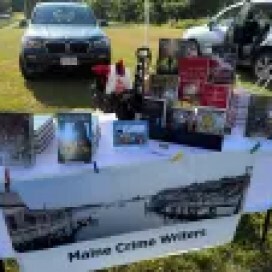
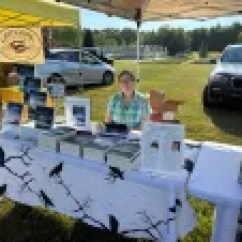
August 31, 2025
The Strange Business Model of Kathy Lynn Emerson
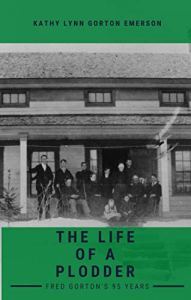
first effort at Indie publishing
Kaitlyn Dunnett/Kathy Lynn Emerson here, today sharing what can only be described as my very strange business model. Even back when I wrote for traditional publishers (64 titles in all over the years) I was never comfortable with self-promotion. Far too many book signings ended up with me sitting alone at a table in a bookstore, ignored by customers unless they needed to ask directions to the restroom. Group signings were much better. Even if no one came, at least there was someone to talk to. The real downside was that unsold paperbacks were stripped for credit (returns against reserves in terms of my earnings) rather than simply kept by the bookstore to sell or returned to the publisher for someone else to buy.
Library programs with other writers, where we had an audience and at least a few of them were likely to actually buy our books, turned out to be the best investment of time and effort, but even those had disadvantages, schlepping my own books and handling the sales, for one. For a while, I went to an average of one fan conference a month (there were that many small ones back in the day) and did a library program, solo or in a group, every couple of weeks. It was exhausting!

my “bestseller”
Then came Covid. I have to say I didn’t miss all the travel, but suddenly the emphasis in generating publicity shifted almost entirely to online promotion. Some people are okay with putting all kinds of personal details up on the Internet. I am not. I also disliked the proliferation of “Buy my Book!” posts. In person, you can chat with an audience about characters, or the way you write, or where you get ideas, but putting that same information in writing, with no feedback unless someone commented on a post, just wasn’t the same. (Obvious exception: blogging at Maine Crime Writers has always been fun.)
Anyway, I was finally persuaded to start an account (as Kaitlyn) on Facebook. I couldn’t handle Twitter’s length limit (I have the same problem now with Bluesky), and other platforms didn’t strike me as particularly useful for reaching readers. As it turned out, Facebook and this blog weren’t deemed sufficient self-promotion by my last traditional publisher. My lack of a “social media presence” was one reason they gave for dropping my series.
Since that decision coincided with my realization that I had pretty much run out of new story ideas, I proclaimed myself semi-retired, finished the few unsold projects I’d started, and entered the world of Indie (formerly self-) publishing.
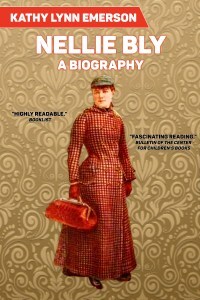
my best seller in children’s books
Now I can hear you thinking—doesn’t that require even more self-promotion? Yes. Yes it does. IF your goal is to earn a living at it. Mine isn’t. My first book was published in 1984. Except for a couple of really good years, I have never earned enough to support myself with my writing anyway, so why start now, especially since, as I get older, I am even less inclined to go out and hawk my wares in public?
And so, my new business model is this: publish e-book and print-on-demand paperback editions of those few books I couldn’t sell and bring out new editions of my Kathy Lynn Emerson backlist. (The rights to Kaitlyn Dunnett and Kate Emerson titles are still with those publishers, so I literally can’t do anything with them.) The goal is to make everything available and keep the prices as low as possible. I’ve stopped stressing about letting people know the books exist. I write about what’s new here and on Facebook. That’s it. That’s literally all I do for publicity these days.
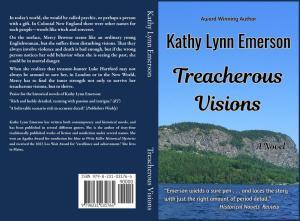
my most recent Indie effort
Since making a profit doesn’t come into it and I don’t have to pay myself for the time I spend working on any one book, my only publishing expenses are optional ones—hiring a cover designer and/or an editor. Draft2Digital takes a small percentage when a book sells, but all the set-up and distribution is free.
Miraculously, despite my lack of promotion, people are buying my books. Not a lot of them, I admit, but enough that D2D makes a deposit in my checking account every month and my profits continue to be enough that the IRS lets me continue to deduct office expenses and the like.
This “business model” probably wouldn’t work for most writers, but it’s the perfect semi-retirement plan for me.

Kathy Lynn Emerson/Kaitlyn Dunnett has had sixty-four books traditionally published and has self published others. She won the Agatha Award and was an Anthony and Macavity finalist for best mystery nonfiction of 2008 for How to Write Killer Historical Mysteries and was an Agatha Award finalist in 2015 in the best mystery short story category. In 2023 she won the Lea Wait Award for “excellence and achievement” from the Maine Writers and Publishers Alliance. She was the Malice Domestic Guest of Honor in 2014. She is currently working on creating new editions of her backlist titles. Her website is www.KathyLynnEmerson.com.
August 29, 2025
Weekend Update: August 30-31, 2025
 Next week at Maine Crime Writers there will be posts by Kaitlyn Dunnett/Kathy Lynn Emerson (Monday), Kate Flora (Tuesday), Brenda Buchanan (Thursday), and John Clark (Friday).
Next week at Maine Crime Writers there will be posts by Kaitlyn Dunnett/Kathy Lynn Emerson (Monday), Kate Flora (Tuesday), Brenda Buchanan (Thursday), and John Clark (Friday).
In the news department, here’s what’s happening with some of us who blog regularly at Maine Crime Writers:
On September 6th and 7th, Kate Flora and Maureen Milliken will be selling books at the Maine Book Fest. It was a blast last year and we hope it will be again. A great opportunity to meet authors and get books.
An invitation to readers of this blog: Do you have news relating to Maine, Crime, or Writing? We’d love to hear from you. Just comment below to share.
And a reminder: If your library, school, or organization is looking for a speaker, we are often available to talk about the writing process, research, where we get our ideas, and other mysteries of the business, along with the very popular “Making a Mystery” with audience participation, and “Casting Call: How We Staff Our Mysteries.” We also do programs on Zoom. Contact Kate Flora
August 28, 2025
What’s Next and What Just Went Down?
With September almost upon us, those still in school are starting a new year of classes. Parents are adjusting schedules to manage both school and after school activities. And Maine crime writers? Well, this seems like a good time to plan for the cold, stay-at-home-and-write days ahead. Here’s a peek at what some of us will be working on once summer comes to an end.
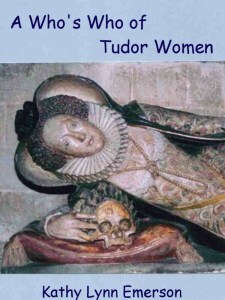 Kaitlyn Dunnett/Kathy Lynn Emerson: Since I started Indie publishing my Kathy Lynn Emerson backlist titles in 2020, I’ve managed to make almost all of them available in both e-book and print-on-demand trade paperback formats, but there has been one big (and I do mean big) exception. Because it runs to 2556 pages, my A Who’s Who of Tudor Women (over 2300 mini-biographies of women who lived in England during the years 1485-1603) has only been available as an e-book. Early on, I started receiving requests for a print version, but not only would it have to be very expensive, it would also have to be in 2-3 parts because there is a limit on the number of pages in a POD paperback. I also hesitated because I knew I’d have to proofread the whole thing (again!) to catch any remaining typos in the current version and to make a couple of corrections—I have had some wonderful e-mail exchanges with people researching their family histories and/or writing their own books about the period, both fiction and nonfiction. Anyway, to make a long story a little shorter, my fall and winter project is a careful proofread of the current text, followed by a corrected e-book edition and a (probably) three-volume POD edition. It will still be expensive, at around $22 for each volume, but at least it will be available. Since the e-book version has been my Indie bestseller, I have hopes that at least a few will sell. This, by the way, is the upside of being semi-retired. I can take my time and do it right, and it won’t cost me anything except time because I self-publish through Draft2Digital and they don’t charge for set-up. Win-Win, right?
Kaitlyn Dunnett/Kathy Lynn Emerson: Since I started Indie publishing my Kathy Lynn Emerson backlist titles in 2020, I’ve managed to make almost all of them available in both e-book and print-on-demand trade paperback formats, but there has been one big (and I do mean big) exception. Because it runs to 2556 pages, my A Who’s Who of Tudor Women (over 2300 mini-biographies of women who lived in England during the years 1485-1603) has only been available as an e-book. Early on, I started receiving requests for a print version, but not only would it have to be very expensive, it would also have to be in 2-3 parts because there is a limit on the number of pages in a POD paperback. I also hesitated because I knew I’d have to proofread the whole thing (again!) to catch any remaining typos in the current version and to make a couple of corrections—I have had some wonderful e-mail exchanges with people researching their family histories and/or writing their own books about the period, both fiction and nonfiction. Anyway, to make a long story a little shorter, my fall and winter project is a careful proofread of the current text, followed by a corrected e-book edition and a (probably) three-volume POD edition. It will still be expensive, at around $22 for each volume, but at least it will be available. Since the e-book version has been my Indie bestseller, I have hopes that at least a few will sell. This, by the way, is the upside of being semi-retired. I can take my time and do it right, and it won’t cost me anything except time because I self-publish through Draft2Digital and they don’t charge for set-up. Win-Win, right?
Maureen Milliken: I’m working on NEWS FROM AWAY, the next book in my award-winning Bernadette “Bernie” O’Dea series. Look for it in November. If I get it done when I’m supposed to.
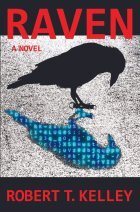 Rob Kelley: I’m gearing up for the launch of my debut, Raven, on October 28. 2025: working on getting pre-publication reviews, reaching out to schedule readings, and making sure bookstores are going to carry it! This is my first book marketing blitz and I’m finding it, frankly, a little daunting. But joyfully soldiering on nonetheless.
Rob Kelley: I’m gearing up for the launch of my debut, Raven, on October 28. 2025: working on getting pre-publication reviews, reaching out to schedule readings, and making sure bookstores are going to carry it! This is my first book marketing blitz and I’m finding it, frankly, a little daunting. But joyfully soldiering on nonetheless.
At the same time I’m in final edits on my next book, Critical State, which is due to my publisher, High Frequency Press, in January and is scheduled for a fall 2026 publication. This is the first in a new series set in present-day Boston and Silicon Valley with a new protagonist, journalist Olivia Wolfe (shout out to Brenda Buchanan’s Joe Gale series as an inspiration!). Book two in the series (as yet untitled) is already under contract, so I’m also noodling on exactly where that book will take me (though I already know it starts off in London with a reveal with global economic implications!).
Matt Cost: I will be busy promoting my recently published Glow Trap–speaking at libraries, signings at bookstores, and whatnot. I’d love to hear from any libraries, bookstores, or book clubs.Edits and marketing for two books with the publisher set to be released in 2026 will also keep me busy–EveryThing vs Max Creed and 1955. I am currently shopping around looking for an agent for a new series, book one being titled Bob Chicago Investigates. I will be attending two conferences this fall. The first is Crime Wave which has Noir at the Bar on September 26 and roundtables on September 27.
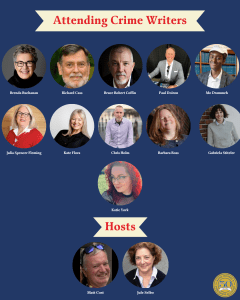
I will be sharing the master of ceremonies spotlight with Jule Selbo on that Friday night at Novel in Portland, Maine, with a stellar cast of writers. And on Saturday, I will be teaching a workshop on the Six Hats of a Writer. In November, I will be reconnecting with many friends at Crime Bake. And, of course, I am writing. Currently, I am finishing up the third book in the Chronicles of Max Creed, entitled Max Creed takes the Spice Road. And then? Write on!
Jule Selbo. I attended Killer Nashville Aug 22-24 in Nashville Tennessee – along with about 400 other mystery crime writers. Sara Parestky was there and she was lovely and everyone (as they should) were talking to her about her influence. I got to hang up with some other writers that I can now consider as ‘writer-friends’ and that’s one of the reasons to do these conferences. T K Sheffield (Model Ghost) who writes in the Crime/Mystery/Comedy mode and Jim Nesbittt (Crime/Mystery/Western) and Matty Becker (Historical Crime Mystery) and Teel James Glenn (Crime/Mystery/Horror) also catch up with Barbara Newhart (met her at Malice Domestic last April and new to the genre and met first time, Michael Lucker (Rule One, Crime/Mystery/Action) and many more. I did 4 presentations (Structure, Story Genre, Adapting Book to Film and The Power of “No” in crime mysteries), so I got to interact with a lot of people who came to the presentation in a great way – hearing more about their work. Came home exhausted – but still thinking about the good times. Now the focus is CRIME WAVE in Portland Maine – coming up end of September- and having at great time with Matt Cost at Topsham Library here in Maine April 28th!
Kate Flora: I’ve been trying to finish the next Thea Kozak mystery, Until Death Do Us
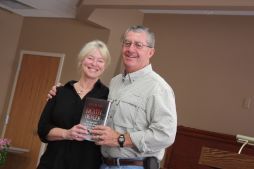
Kate and game warden Pat Dorion with Death Dealer at the Newport Library
Part, for so long I’m beginning to think this is the book I will never finish. But I’m back to making myself write a thousand words a day, so there’s still hope. I have passed the 60K mark, which is something. When I’m not puzzling about who killed the headmaster at the prestigious Grimley School, and why, I’m trying to tweak the manuscript for my other true crime, Death Dealer. I’ve never been entirely happy with the way the publisher edited it and now that I have the rights back, it’s mine to tweak at will. It’s fascinating to closely reread a book I wrote years ago. Still a very compelling story. There are a few other projects like that awaiting attention. When the Thea is done, I’m going to write another romance, Emily and Mr. Rogers, about a widowed librarian and a match-making neighborhood cat. I’m hoping it will be a lot of fun. Otherwise, looking forward to Noir at the Bar and the Crime Wave, a great book event in Waterville, The Maine Book Fest, on Sept. 6 & &, and some other fun events this fall.
Sandra Neily: I WILL finish the 3rd “Mystery in Maine” this year. I have it plotted out; now it’s just … butt in the chair time. It looks like I will be serializing the beginning of this mystery in our area newspaper, hopefully to jump start a conversation about current development pressures. I plan to get an audio book out for “Deadly Trespass.”  I have a goal to set up guest visits on at least two podcasts this year, and I bought a tripod for my phone and will be offering up short readings for my YouTube channel. I plan to do these readings in various outdoor locations that might be unusual: half buried in leaf pile for example. Am feeling like I have not been visible enough, hence this ambitious list.
I have a goal to set up guest visits on at least two podcasts this year, and I bought a tripod for my phone and will be offering up short readings for my YouTube channel. I plan to do these readings in various outdoor locations that might be unusual: half buried in leaf pile for example. Am feeling like I have not been visible enough, hence this ambitious list.
August 27, 2025
T[FD]I August
Thank [insert FAVORITE DEITY here] it’s August, OK? Though by the time you see this, it will be late in the month and your chance to wish me a happy birthday will have gone by. But—August: corn, blueberries, peaches,  a little cooler at night, a little darker in the morning. Those flashes of heat and humidity a little less fierce, a little more promise of fall.
a little cooler at night, a little darker in the morning. Those flashes of heat and humidity a little less fierce, a little more promise of fall.
My theory is that July is the run-on sentence of the summer, the longer and more frantic of the two summer months. Most people roar into July with all the energy of FOMO and a desire to cram as much activity into a two week vacation as they can. Too many words, spoken too fast, all in a row.
August, though, is a comma, a pause, a place where the sentence of the summer slows down. The returning visitors who favor the month embrace a slower pace, lazier days, less rock and roll and firework-filled nights. More campfires, cribbage games, watching for fireflies. And in the second half of the month, the families with school age children are peeling away, more focused on what’s coming than what is present.
The comma of August also reminds those us who live here of what we have. The bounty of the garden and the farm stands, the welcome shock of Kettle Cove after a lawn-mowing session, a cup of coffee on the sun porch before the neighbors wake up. These are small things to treasure against what we know is coming. August is about taking a breath.
after a lawn-mowing session, a cup of coffee on the sun porch before the neighbors wake up. These are small things to treasure against what we know is coming. August is about taking a breath.
There’s little left to do in the garden, some weeding maybe, more harvesting, but it’s too early to start cleaning it up. The high energy of July slides away into a slower mellower pace and we have the sense the world is balanced on the edge of a long lazy pause before we plunge back into the world of work and schedule and obligation, our other life.
Because it’s my birth month, August has outsized importance for me. I’ve finished the draft of the next book in time for my birthday and I plan to luxuriate in laziness until the end of the month. So August is a comma for me too, an opportunity to pause for a bit at the bottom of the next hill to climb, drink a beer, have a fried haddock sandwich, 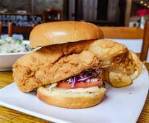 and eat corn and peaches until I can’t. The upward climb starts again soon enough. I hope you have found your August and blessed yourself with it. We will need its memory soon enough.
and eat corn and peaches until I can’t. The upward climb starts again soon enough. I hope you have found your August and blessed yourself with it. We will need its memory soon enough.
Lea Wait's Blog
- Lea Wait's profile
- 507 followers



